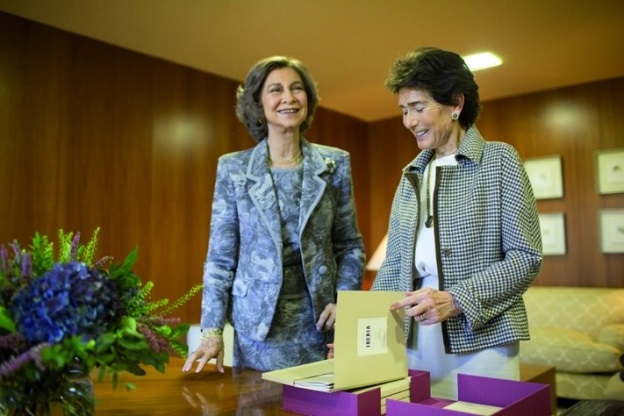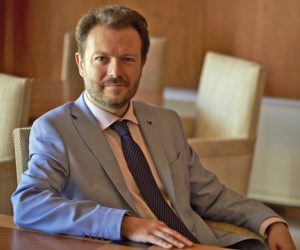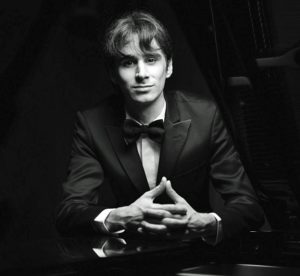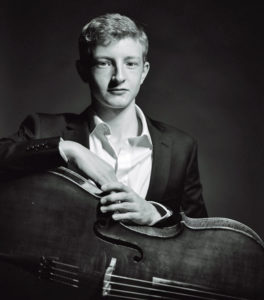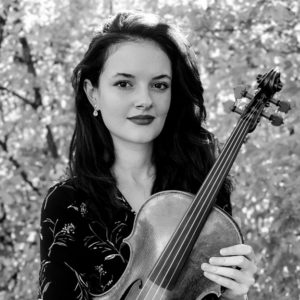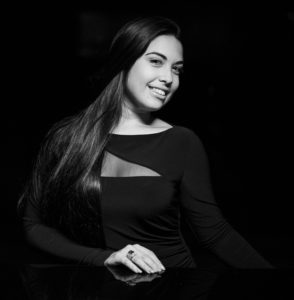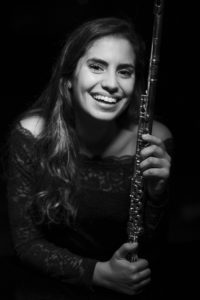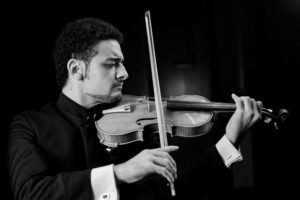
The Reina Sofía School of Music: a building by architect Miguel de Oriol in Madrid’s Plaza de Oriente
Located in a magnificent building in the heart of Madrid, next to the Royal Theatre and the Royal Palace, the School welcomes each year around 150 young musicians from more than 30 countries. All students enjoy free tuition thanks to the sponsors’ contributions. Considering its two main objectives, to support talented young musicians in their personal and artistic development and to bring music closer to society, the School has trained over the last three decades more than 800 musicians who are developing their artistic careers all over the world, including Arcadi Volodos, Eldar Nebolsin, Sol Gabetta, Pablo Ferrandez, David Kadouch, and Celso Albelo.
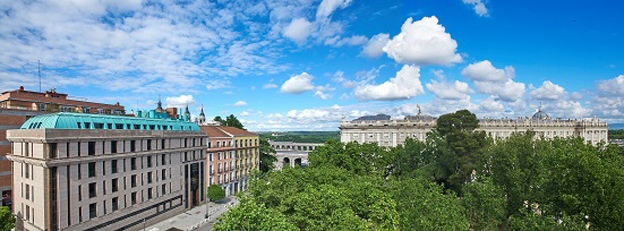
The Reina Sofía School of Music: a building by architect Miguel de Oriol in Madrid’s Plaza de Oriente
The School’s success is a consequence of its pedagogical principles. Students are selected solely on musical merit in an audition process, with an acceptance rate of 6%, and professors have complete freedom to design their own teaching plan, tailored to each case.
Currently, there are 13 disciplines being taught – violin, viola, cello, double bass, flute, bassoon, oboe, clarinet, French horn, trumpet, piano, voice, and composition – which allow four academic programs to be followed:
-Bachelor’s Degree, official degree within the European Higher Education area and the Bologna Plan.
-Master’s Degree in Music Performance, for performers who wish to combine specialization and technical improvement on their instrument with critical reflection on the phenomenon of performance.
-Foundation Course: preparatory course for future Bachelor and Master’s degree students.
-Diploma in Music Performance: for musicians that have completed all their academic and artistic training and seek perfecting their artistic level.
With more than 300 concerts programmed for each academic year, the School fulfils its principle of “bringing music closer to society” through free concerts, reduced-price concerts, streaming, or resources published on Canal Escuela.
In addition, aware of the transformative power of music and its impact on society, the School has several projects aimed at different groups: from concerts for primary school children to musical programs in hospitals, including the Entrepreneurship and Social Innovation Program in which students develop skills that go beyond performance and, at the same time, they become aware of the role they play as artists in the society (under the learning by doing methodology, students learn concepts of budgetary and administrative management, teamwork, communication, and digital marketing).
Social projects of technological innovation and other arts are a reflection of the projects that young musicians develop within the Entrepreneurship Program of the Reina Sofía School.
Oscar Colomina, Dean of Reina Sofia School of Music
Mr. Colomina, the Escuela Superior de Musica Reina Sofia is very renowned. What are the secrets of such a success?
The School was founded on a number of key principles to which we remain faithful:
– To recruit internationally renowned professors with a truly remarkable profile and wide experience both artistic and pedagogical.
– An individually tailored program of study, possible because of being a small community.
– A commitment to inclusiveness, thanks to a scholarship system which covers the full cost of the fees (around 45,000€ per student per year) for all students. All students enjoy free-tuition.
– The School believes that performing in front of an audience is an integral part of the musical and human development of the students and for that reason we offer them a high number of performance opportunities (solo recitals, orchestral projects, contemporary projects, chamber music, etc). We organize around 300 concerts per year in the School and in outside venues.
And how do you select students?
We have a very complete selection and audition process that is aimed at identifying candidates with talent and with the potential to fulfill it. It includes a very thorough online application, a first round based on video material and a final round playing in person in front of a panel, plus interview. If this is not conclusive, we reserve the right to ask certain candidates to have some lessons with the professors before making a final decision. At present our admission rate is 6%.
You just lost a formidable professor, Dmitry Bashkirov. How can you fill the vacuum left by such a teacher?
There are historical moments when very individual figures appear that embody so powerfully a certain epoch that they become ‘central’. In the context of piano performance and pedagogy, Dmitri Bashkirov was one of such formidable characters with which history sporadically blesses us. We were privileged to have him working with our students for such a long and fruitful time.
But one generation will always be succeeded by another and the challenge for an institution going forward from there is to be able to combine sensitively a sense of identity, of heritage and tradition with a sense of renewal and continued actuality in order to maintain its function relevant both to the students it serves and to the world it lives in.
If you had to compare: To which other great High School does Reina Sofia resemble the most?
The Reina Sofía School has often been referred to as the ‘European Curtis’, because of its size and general outlook on musical education.
And what distinguishes it from other schools?
For me, the individualization of the educational experience, something we can achieve because of our reduced student numbers and the great quality of our teaching staff. This allows us to curate very carefully the way we feed opportunities to our students, choosing a performing experience for a specific student at a specific time and point in their development – which results in a heightened developmental effect and avoids many of the pitfalls of doing too much too soon.
Music colleges like to see themselves as elitist institutions. How do you cope with this and how do you take care of the common people, i.e. the local community.
It is an ingrained misconception that music colleges are elitist. As I mentioned earlier, the Reina Sofía School sees itself as an important agent of social transformation, since thanks to our scholarship system, we are able to offer a very exclusive education to many students coming from disadvantaged backgrounds – based purely on their talent.
Because of how they are selected and their studies funded, our students are not only a very diverse group, but also one that is particularly sensitive to social matters. The School also fosters their social sensitivity further in our Entrepreneurship Programme by encouraging students to take part in community engagement programmes or to develop their own outreach projects.
Through these activities, together with their own experience, our students can develop a more attuned social awareness which has the potential to make them ‘agents of change’ for life.
A school has always to innovate. What do you do to progress?
The COVID crisis has dramatically accelerated the rate of change in our society. Evolutions that would have extended over years, have precipitated in a matter of a few months. This acceleration of change magnifies the social, economic and emotional impact of the changes.
At the Reina Sofía School we are more aware than ever of the need renew and adapt the curriculum to be able to offer training in the tradition, but also in new areas so that our students can develop the necessary tools to lead a successful artistic life.
How do you prepare your students for the professional life? The Corona crisis has shown how fragile a career can become.
Corona has also increased the asymmetries between certain types of time which coexist today.
The world, generally, is now operating from a fast sense of time. Of course, there are certain educational and artistic aspects which can be taught and learned rather quickly – mostly conceptual elements and thought structures.
However, there are very important parts of the human experience, of education and learning and of artistic development, which operate and develop on a slow time, because they are not so much based on concepts, but on developing awareness and the refinement of the experience that comes from that progressively refined awareness. The greater part of music and music-making operates with a sense of slow time, and that is its great value.
We need to acknowledge the existence of that rift and the tension that comes between those different ways of understanding time, so that we can support students (an here entrepreneurship and the other curricular changes mentioned above are key) to develop all the different and necessary types of mind-set to understand the way time works on different lanes, so that they can excel and have a successful life and career.
And what challenges your school will face in the future?
Of course, fundraising is always a challenge. We fundraise every year most of our budget and this challenge is always different, as the circumstances and priorities of the donors evolve.
As an institution we need to keep offering an education to our students which carries on the best of the musical tradition, but also gives them the tools and strategies to actualize that tradition and knowledge to their context.
The success of the two prior points ensures then that the School keeps being relevant to the world and to the students we educate – our most important mission.
Tomas Alegre, piano
My name is Tomas Alegre, I’m 28 years old and I’m from Buenos Aires, Argentina. I’ve studied with the great teacher Nelson Goerner at the Geneva University of Music, Switzerland, before continuing my studies with the legendary professor Dmitri Bashkirov at the Reina Sofía School in Madrid where I finished the Bachelor’s Degree in Music and the Master’s Degree in Music Performance. I am currently preparing the Diploma in Music Performance.
What is exceptional about the Escuela Superior de Musica Reina Sofia, what do you have here which is not available at other schools?
The teachers, the infrastructure, the pianos and the beautiful Sony Auditorium, where we often give concerts and also we have the possibility to record ourselves with the highest quality.
Was it difficult to become accepted?
Yes, because it is necessary to have a very good previous preparation and there are two stages to be selected: first it’s an online recording, and then, if they approve it, the face-to-face audition takes place in front of the piano teachers and School directors.
Did you feel welcome? Was it easy to become a student, to benefit from the international atmosphere?
Yes, I felt very welcome. The President of the School, Paloma O’Shea, and my teachers received me very well. I felt the international atmosphere especially in chamber music playing with people of a very high level, which in my country I would not have been able to do.
Was the orientation within the courses offered by the school easy? Did you feel well guided?
Yes.
Is your schedule very tough or rather relaxed?
Now it is more relaxed because I can organize myself better in my instrumental practice since I finished the Bachelor and the Master, and the current Degree focuses only on the instrument.
Do you have the feeling that the school prepares you not only for your instrument but also for the career, for aspects like contracts, fees, traveling, agencies, etc?
The School provides in broad strokes these aspects but it’s not enough to become our own managers.
Willard Carter, cello
My name is Willard Carter, I am from England and I am nineteen years old. In 2018 I started learning with Ivan Monighetti at the Escuela de Musica Reina Sofia in Madrid. I have performed in The Wigmore Hall, The Charterhouse, The Goldsmiths Hall, Buckingham Palace and Windsor Castle. In May 2019 I performed again in Buckingham Palace, which was later broadcast on Classic FM. I have since been selected as a Rising Star for Classic FM. In May, 2021, I will play a recital in the Solsberg Festival in Switzerland. In February 2020 I came 2nd in the Anna Kull International Cello competition in Austria.
What is exceptional about the Escuela Superior de Musica Reina Sofia, what do you have here which is not available at other schools?
The Escuela de Musica Reina Sofía is a very unique place where as a student, one can have opportunities and experiences that you can’t find anywhere else. One of the things that continues to amaze me, is the level of teaching. The professors that teach in the school are of such a high praise and esteem, it would be difficult to top that. Every student is spell-bound by their teacher and we all have such a united respect for all the musicians that come to the school. The masterclasses and the musicians that come to the school are really exceptional. The students will talk with one another months before a musician comes to the school to give a masterclass with excitement and anticipation. Also the connections that the school has to concert halls all around Spain, to art galleries, to other schools, to online music scores, music magazines, even to music shops that help the students buy accessories for their instruments at a discount. There is so much culture that the school has to offer and it’s continuously motivating.
Was it difficult to become accepted?
Every year the school has a lot of musicians applying to the school, so naturally it was difficult to get accepted but for me, knowing that this was the place I really wanted to be, it pushed me to want it more and work harder to get into the school. I am lucky that I already met my teacher a bit before applying to the school. I think that’s always a good idea. Good to try before you buy!
Did you feel welcome? Was it easy to become a student, to benefit from the international atmosphere?
I remember my first few months at Reina Sofía very well. Everyone I met was so kind, if it was showing me around, helping me with something or introducing me to someone, everyone wanted to help. All the students have such a friendly relationship with one another, it’s very beautiful to be a part of something like that. Also to be able to play and perform music with people from around the whole world is something so very special.
Was the orientation within the courses offered by the school easy? Did you feel well guided?
The orientation within the courses is very comfortable. I have never felt lost in what I’m doing nor have I experienced any expectation that I should have done something that I wasn’t told to do. The school makes sure that everything is very clear and they always let the students know months before if we need to do something.
Is your schedule very tough or rather relaxed?
Every student has a very different schedule and every student has a schedule that is always very busy. I am very happy with my timetable. I am continuously challenged and pushed which I really like and I have enough breaks in my day to make everything I do effective and do it with energy. Sometimes I feel a bit stressed if there are a several long essays that I have to write for the academic music subjects and I am busy with concerts or competitions. Then I would have to make sure that I am not putting too much pressure on myself.
Do you have the feeling that the school prepares you not only for your instrument but also for the career, for aspects like contracts, fees, traveling, agencies, etc.
With the huge amount of concerts that the school offers us, it is incredible preparation for a professional life as a musician. There is an intense expectation that we are given but this is great motivation to play better and to push ourselves to be the best musicians that we can be. I know many musicians who have finished their studies at Reina Sofía but the school continues to support them and include them in concerts.
Cristina Cordero, viola
My name is Cristina Cordero, I am 23 years old and I come from Madrid, Spain. I play the viola and I am currently preparing my Masters degree at Reina Sofia School of Music.
What is exceptional about the Escuela Superior de Musica Reina Sofia, what do you have here which is not available at other schools?
The school is very small, everyone is very friendly with each other, we are like a family. Also we get many concert and project opportunities that we cannot get as easily in other places, which makes us grow and develop our potential to the maximum.
Was it difficult to become accepted?
Becoming accepted in this school means a lot of hours of practice and hard work, very few students are accepted because, as I said before, it is very small and there are not so many free places available every year. I was very lucky to be accepted and very happy I can study here.
Did you feel welcome? Was it easy to become a student, to benefit from the international atmosphere?
Yes, of course. Everyone is befriended with each other and there is a very rich cultural exchange with all of the students.
Was the orientation within the courses offered by the school easy? Did you feel well guided?
Yes.
Is your schedule very tough or rather relaxed?
The schedule is very tough. It’s very rare to see a free day on it, even on weekends we have lessons.
Do you have the feeling that the school prepares you not only for you instrument but also for the career, for aspects like contracts, fees, traveling, agencies etc.
I would say yes, but only to a certain extent. I think that the experience outside the school will eventually be the real teacher to learn some of those things.
Maylin Cruz, soprano
My name is Maylin Cruz Fonseca, I am 25 years old and I’m from Cuba. One of my greatest achievements has been to enter the Reina Sofía School of Music, since it has been one of my dreams and is the desire of many musicians, because the school has great teachers, international figures of great prestige, with which most dream to study, which bring a high level and prestige to the institution.
What is exceptional about the Reina Sofía School of Music, what do you have there that is not available in other schools?
The interest of the school is that students and teachers feel at home. We have facilities and equipment that make the stay at the school more pleasant and make the most of each space, to take advantage of it. The school environment is the best. The relationship that is established is one of companionship and friendship.
Was it difficult to be accepted?
It was difficult, because due to its high prestige, the school has many candidates for entrance examinations and there are few places. It is a very rigorous process that is carried out through auditions, in which the only selection criteria is talent.
Did you feel welcome? Was it easy to become a student, to benefit from the international environment?
From the first moment in school, I felt at home. I witnessed the support provided by the school’s staff and by the teachers. Their greatest interest is to hone the talent of each student and nurture with their professional experience to get the best out of us. The international environment allows us to get to know other cultures, which translates into growth of our general culture.
Was the orientation within the courses offered by the school easy? Do you feel well guided?
I feel well guided. I know that any doubt I have or need I can count on any of the institution’s staff and we have departments for everything, which guide us and help us and ensure that we take advantage of every second of our training.
Is your schedule very hard or rather relaxed?
The schedule depends on many factors. There are very hard days. But that depends on each student. The schedule is quite flexible.
You have the feeling that the school prepares you not only for your instrument but also for your career, for aspects such as contracts, fees, travel, agencies, etc.
The commitment of the school is that each student when they finish their academic training, is a professional, with all the tools to succeed on stage and be a complete artist. Students have the opportunity to perform live before the public, either in the School Auditorium or in various stages. The school is a first-rate quarry.
In addition to musical training, the School teaches how to develop projects of a social and cultural nature, with the guidance and preparation of experts. It is the entrepreneurship program, to equip students with skills that will be useful and necessary in our professional lives.
Ana Ferraz, flute
Ana Ferraz, 25 years old, Porto, Portugal.
Bachelor – The Haute École de Musique (HEM) (the Geneva University of Music) (with honors)
Master – Conservatoire national supérieur de musique et de danse de Lyon (with honors)
Post graduation- Reina Sofia School of Music
First Flute – Gustav Mahler Jugendorchester
What is exceptional about the Escuela Superior de Musica Reina Sofia, what do you have here which is not available at other schools?
The most amazing thing about the Reina Sofía School is that we have the opportunity to play on stage again and again. This is the most important part of our life as professional musicians and something we can’t find at any other school.
Was it difficult to become accepted?
It is always difficult to be accepted in a school like this. We need to pass a long process but the effort is worth it.
Did you feel welcome? Was it easy to become a student, to benefit from the international atmosphere?
Very much! I feel that we are like a big family in the school, I don’t feel myself like a number, I have a lot of support and help from my colleagues and the staff.
Was the orientation within the courses offered by the school easy? Did you feel well guided?
We have a personalized schedule that we receive every week. Of course that was not easy at first, but with the orientation and the staff supporting us, it became easily more achievable.
Is your schedule very tough or rather relaxed?
My schedule is very busy, but not impossible to manage. And if I ask in advance to do other projects out of the school like GMJO, they kindly adapt for me to be able to do that.
Do you have the feeling that the school prepares you not only for you instrument but also for the career, for aspects like contracts, fees, traveling, agencies etc.
100%! I have developed skills to manage my own career, and I have learnt a lot with the Entrepreneurship program. How to create contracts, what we need to do to prepare a show, etc…
Kamran Omarli, violin.
I am Kamran Omarli. I was born in Azerbaijan, Baku, in 1994. Before coming the School, I had already won several national competitions in my country, had played in international festivals, and had master classes with Maksim Venguerov, Sergei Krylov and Eduard Grach, among others. I entered school in 2012 when I was 17 years old.
What is exceptional about the Escuela Superior de Musica Reina Sofia, what do you have here which is not available at other schools?
The most special thing about our School is that it makes you feel at home, with friends, colleagues, we form a great family. The contact with the staff, with the professors… in my case with Professor Zakhar Bron, for me it makes it even more special. It’s the place to study and be happy.
Was it difficult to become accepted?
In order to be accepted into the School, you first have to study hard and try to play the pieces of the auditions in the best possible way, rehearse them a lot. In my case, I met months before the auditions with my current professor. I was participating in the International Henryk Wieniawski Violin Competition, and Zakhar Bron was in the jury. He already had the opportunity to listen to me in two rounds of the competition. So in my own audition at the School I was not so stressed because he already knew me, but still I prepared different pieces from the ones he had previously heard me.
It’s quite a difficult an emotional test. You have to keep cool so that the music at that time flows.
Did you feel welcome? Was it easy to become a student, to benefit from the international atmosphere?
From the first day I have felt the affection of many people. Starting with the people of the office with emails before entering the School, I already felt that I am very welcome. Although I did not speak English well and I did not speak Spanish at all, it was easy for me to adapt to the School.
Having so many nationalities in the School, from so many parts of the world can only be beneficial. It is very useful and important for students because that way you meet people from other places and they open up your vision and your knowledge of that country, its culture, its music, and if you have a good colleague from another nationality, you end up knowing a lot about their traditions. For musicians and artists is important to know it and thus you get a good idea of that country, of its people.
Making music with people from other countries once again is a demonstration that despite a different language, music is the only universal language that unites, that we all feel and speak through musical notes.
Was the orientation within the courses offered by the school easy? Did you feel well guided?
I feel good. We know the curriculum, there is no surprise. Theoretical classes, rehearsal hours, hours with the professor, hours with the deputy professors, master classes, artistic activity in constant movement with concerts… phenomenal!
Is your schedule very tough or rather relaxed?It depends. The first years I sometimes had many classes, some days five to six classes. At that time it was quite difficult to study other things on a personal level, but everything is forgotten as you improve and achieve more quality in your performances. I think that about the planning of the classes, the schedule, how it is done from the Academic Area of the School is quite adequate.In recent years I’m more relaxed in this sense because I’m already studying the Master and perfecting myself, and it does not involve as much effort as the official title.
Do you have the feeling that the school prepares you not only for you instrument but also for the career, for aspects like contracts, fees, traveling, agencies etc.The School has been working on this in recent years. Since 2017 it offers the Master’s Degree in Music Performance, and it has a course on Entrepreneurship and Innovation from which we have learned new tools to be a complete musician, not just an instrumentalist. It could be improved by going deeper into these subjects of how to develop your career, how to be able to speak with agencies, contracts, managers, cultural programmers … It’s very necessary. A musician does not only has to play, he also has to manage his career and you need to know all this well, with extensive training.
The School is on a very positive path to continue advancing in these matters and I encourage them to do so.











